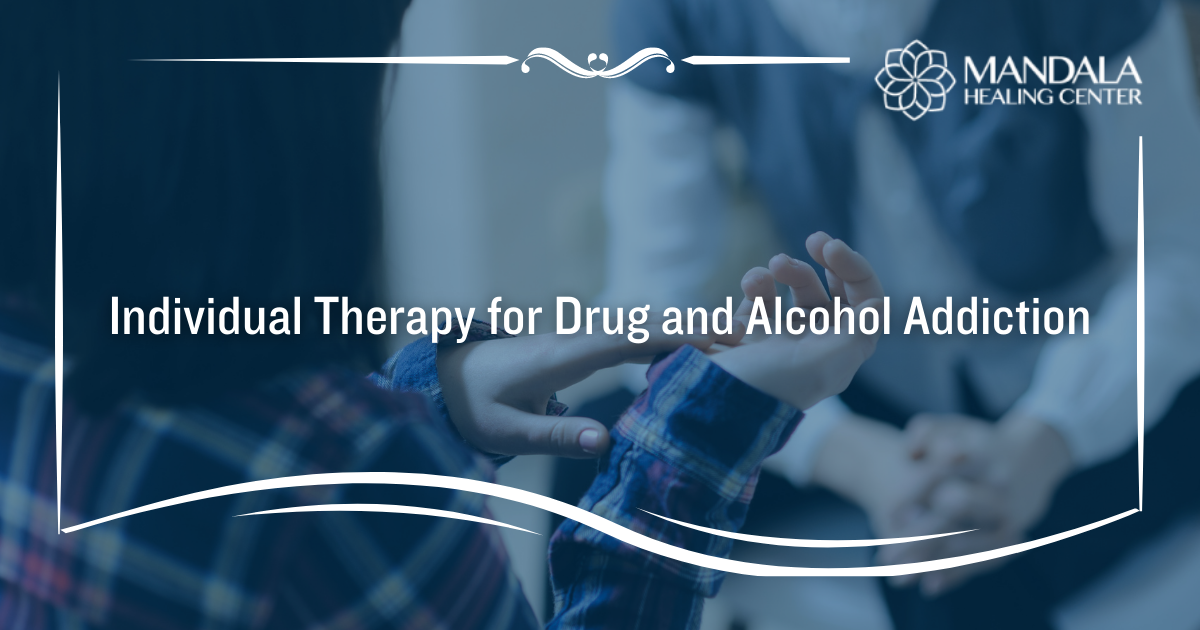When you live with addiction or substance abuse, the condition affects all parts of who you are. It can damage your body, mind, spirit, and community. Most people need some kind of addiction treatment to overcome it and learn to live a healthy, fulfilling lifestyle.
Comprehensive, effective addiction treatment means so much more than simply going through detox. To truly heal from addiction and put it behind you, you need to understand and heal the root causes of the addiction and learn effective ways to cope with whatever challenges lead to developing a dependence on drugs or alcohol.
Therapy is an important part of an effective addiction treatment program. Some people might feel hesitant to start therapy, especially if they have never considered it in the past, and some may be confused as to why individual therapy might be used as part of their treatment plan.
At the Mandala Healing Center, we believe that addiction is a whole-self condition. To truly heal, each part of you needs to be cared for. Understanding what is involved in addiction treatment can help you prepare for your own program and get the most out of your time in treatment.
How is Individual Therapy Used in Addiction Treatment?
In most cases, one-on-one therapy will be part of your addiction treatment plan. In addition to meeting regularly on a one-to-one basis with your therapist, your plan may also include:
- Group therapy
- Family therapy
- Medications
- Mental health treatments
- Holistic therapies such as exercise, nutrition, and recreation
- Education
- Medical treatment
There are many different levels of care in addiction treatment. You may attend inpatient or residential treatment, or outpatient treatment. Individual therapy is an integral part of substance abuse and addiction treatment at every level of care because it has been shown to be essential to long-term success.
Although most therapy sessions are held in groups, individual drug counseling happens once a week. These sessions provide you and your substance abuse counselor with an opportunity to track your progress, address any concerns, and make changes to your treatment plan.
What Are Common Types of One-on-One Drug Counseling?
While most addiction treatment plans include one-on-one drug counseling, there are many different therapeutic techniques and approaches that are commonly used. The methods used will depend on what the therapist is trained to offer and the kind of therapy the client requires or prefers.
Cognitive-behavioral Therapy
Cognitive-behavioral therapy (CBT) helps people identify and then change the patterns and beliefs that can lead to negative or harmful behavior. The main goal of CBT is to help people change their behavior by developing better coping skills.
Matrix Model
In this approach, the therapist acts as a non-judgmental guide and coach and teaches the client ways to avoid relapse. This type of therapy may work well for people who are still developing their confidence when it comes to recovery.
Contingency Model
This model uses rewards for meeting certain milestones. For example, someone might receive movie tickets for a clean drug test or a gift card for reaching a certain point of the treatment program. This method can be used effectively even if people do not feel personally motivated in recovery.
Motivational Interviewing
This kind of therapy aims to keep the client motivated by using their own intrinsic goals and values to stay focused on recovery. People must commit to their own reasons for staying sober, and their motivation comes from within–not from their therapist.
Each of these commonly-used approaches has its own benefits. Many people try several approaches before finding the one that best fits their needs and may continue on in individual therapy long after completing their treatment program.
Why Should I Do Individual Drug Counseling?
Counseling can help with a variety of issues, from managing stress, improving self-image, navigating difficult relationships, and so many more of life’s challenges. When you are living with substance abuse or addiction, you may have some of these issues related to your drug and alcohol use. Or, you may have previous experiences that have contributed to your addiction. In either case, therapy can help you identify and learn to manage these situations as you work through addiction treatment.
Individual therapy allows you uninterrupted time with your counselor and the chance to focus solely on your experiences, issues, and goals. Developing a trusting relationship with your counselor means that you will have a regular, non-judgmental source of support on your recovery journey.
Start Individual Therapy for Drug and Alcohol Addiction Today
If you or someone you love need drug counseling, substance abuse treatment, or any other kind of support during recovery from addiction, please reach out to the staff at the Mandala Healing Center. We offer a variety of programs that are carefully designed to empower people as they heal from addiction. Our staff is dedicated to supporting people at any stage of their journey with addiction recovery. We know that anyone can achieve their goals if they are given the right treatment.
Don’t wait another day for the treatment you deserve. Call today to speak to one of our caring specialists.












